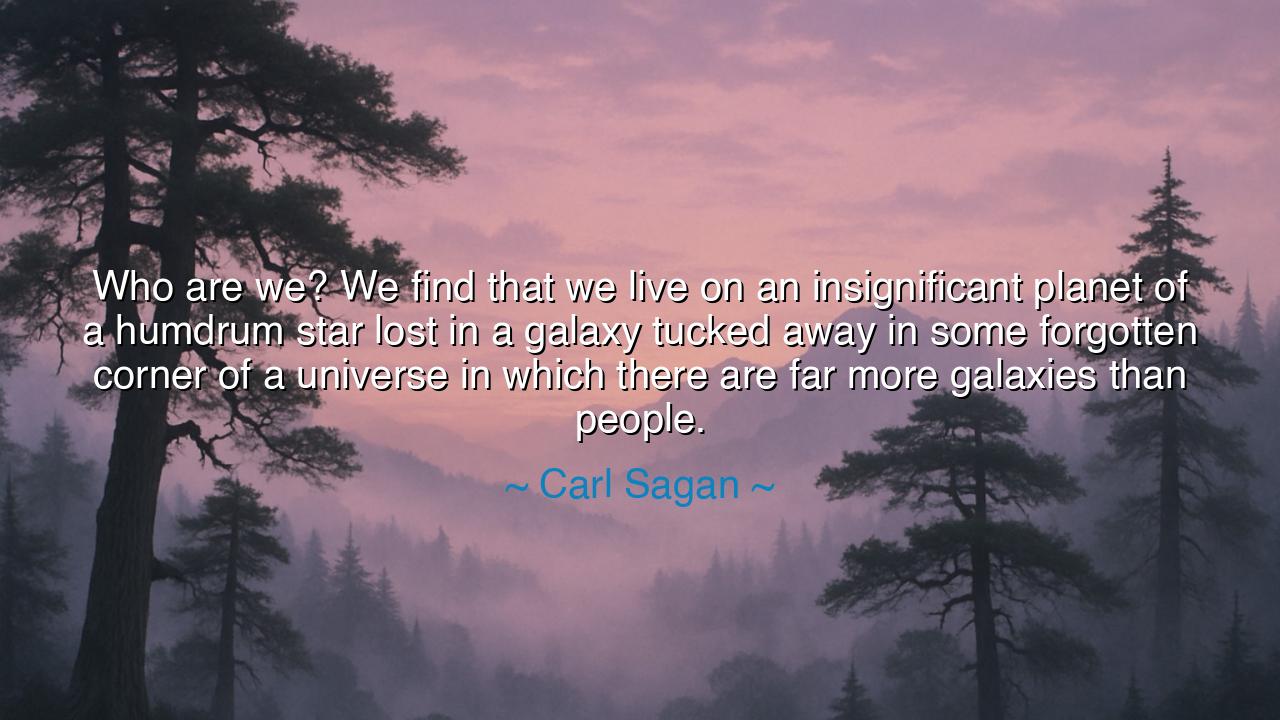
Who are we? We find that we live on an insignificant planet of a
Who are we? We find that we live on an insignificant planet of a humdrum star lost in a galaxy tucked away in some forgotten corner of a universe in which there are far more galaxies than people.






In the endless expanse of the cosmos, where stars are born and die in the blink of an eye, and galaxies swirl in an eternal dance, there is a truth that has echoed through the ages: humanity is but a fleeting speck in the grand tapestry of the universe. The great Carl Sagan, whose mind was both humble and visionary, captured this profound realization when he said, "Who are we? We find that we live on an insignificant planet of a humdrum star lost in a galaxy tucked away in some forgotten corner of a universe in which there are far more galaxies than people." These words are both a wake-up call and a comforting reminder. They stir within us the awe of our place in the universe and challenge us to confront the smallness of our existence in the face of an infinite, boundless cosmos.
The ancients too understood the vastness of the universe, but their approach was often shaped by myth and the idea of divine forces governing the heavens. The Greeks believed that the gods resided in the heavens, far above the reach of mortals. They saw the stars as immortal beings, representing both mystery and order. The philosophers of old, such as Plato and Aristotle, saw the heavens not just as a physical reality but as a symbol of divine perfection. To them, the vast expanse of space represented a higher truth, one that transcended human understanding. But even in their time, the question of humanity’s place in the cosmos lingered. Sagan’s words echo this ancient quest, reminding us that while we may reach for the heavens, we are still, in many ways, insignificant in the grand scale of the universe.
Consider the story of the early astronomers, like Copernicus, Galileo, and Kepler, who dared to look up at the stars and question their place in the cosmos. For centuries, humanity believed that Earth was the center of the universe, that we were the chosen beings of creation. But when Copernicus proposed that the Earth was not at the center of the universe but rather a small part of a much larger system, the world was shaken. Later, Galileo, with his telescope, confirmed that the Earth was not unique in its position. He had opened the door to the realization that the universe was far grander than anyone had imagined. Sagan’s quote builds upon this legacy, reminding us that, even in our greatest achievements, we are still just a tiny piece of a vast, almost incomprehensible cosmos.
The idea that we live on an insignificant planet within a humdrum star reflects our long-held fear of insignificance. The ancients feared that their lives and actions might have no lasting effect in a universe governed by gods or fate. This fear of insignificance is part of the human condition—we long for meaning, to know that we matter in the grand scheme of things. Yet, Sagan’s words challenge us to reconsider this. Insignificance, in his view, is not something to fear, but something to embrace. It is a recognition that, in the face of the infinite, we are but fleeting moments of consciousness. And yet, this recognition opens up the possibility for true humility and wonder—for in realizing how small we are, we also realize how much there is to discover, to explore, and to understand.
In modern times, we still grapple with the question of our place in the universe. We have sent rovers to Mars, launched satellites into the far reaches of space, and looked out into the stars with the hope of finding other civilizations. But the more we explore, the more we are confronted with the reality that the universe is far more vast and mysterious than we could ever have imagined. The story of the Hubble Space Telescope, for instance, shows us the limitlessness of the cosmos. When it captured the Deep Field image in 1995, we saw thousands of galaxies—each one containing billions of stars, and perhaps billions of planets. The realization that we are but one tiny part of this infinite tapestry is both humbling and empowering. For in understanding our smallness, we open ourselves to the vastness of possibility.
The lesson here is one of humility and wonder. Sagan’s quote reminds us that our place in the universe is both insignificant and significant at the same time. Though we are but a small speck on a tiny planet, circling an unremarkable star, we have the ability to ponder the universe, to explore its secrets, and to seek knowledge about the cosmic order. We are not limited by the vastness of space, but rather, we are empowered by it. The true miracle of our existence is not that we are the center of everything, but that we have the ability to seek answers and to make our mark on the world and the stars.
So, let us embrace our insignificance with grace and curiosity, for in recognizing how small we are, we unlock the true power of what it means to be human. Let us not be daunted by the vastness of the universe, but inspired by it. Each question we ask, each discovery we make, brings us closer to understanding our place in this grand, mysterious cosmos. Just as the ancients looked up at the stars with wonder and awe, so must we continue to look outward, knowing that in the vast expanse of space, we are both insignificant and important—one part of an infinite, ever-unfolding story.






AAdministratorAdministrator
Welcome, honored guests. Please leave a comment, we will respond soon